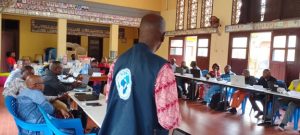10 Sierra Leone FETP mentors train on district health information system
-
by
AFENET


Sierra Leone has used DHIS2 as a national Health Management Information System (HMIS) to collect monthly aggregate data since 2008. Similarly, it was adopted for electronic weekly aggregate disease surveillance reporting (eIDSR) and the Case-Based Disease Surveillance (eCBDS) since 2017. The country has embraced the use of DHIS2 for data collection, analysis and visualisation even during outbreaks i.e. the eCBDS is used for COVID-19 data management including integration with other standalone systems.
It is on this background that Ministry of Health (MoH) declared DHIS2 as the central data repository for national health data as several health program data is stored there. Field Epidemiology Training Program (FETP) relies on the existing national data sources for trainees to conduct field projects. Therefore, the commonly used source of data for trainee research projects is DHIS2. However, there was a little knowledge on data extraction, analysis and visualization by the FETP mentors.
It is against this background that a training aimed at increasing the capacity of 10 FETP mentors on extraction, analysis and visualization, was recently held.
The training of 10 FETP frontline and Intermediate mentors was facilitated by the health Informatics specialist, which entailed data analysis using pivot tables, data and event visualizer and GIS applications. The training was highly practical and hands-on, all participants actively practiced how to generate a line list, different types of charts/graphs and maps. The training was run on existing data on the system to guide mentors during their mentorship sessions.
The training created awareness of the DHIS2 implementations in Sierra Leone as well as building capacity for mentors. In addition, the training empowered mentors to guide and advice their mentees on research projects to undertake based on available data in the system, promote system use and analysis thus improved data quality.



